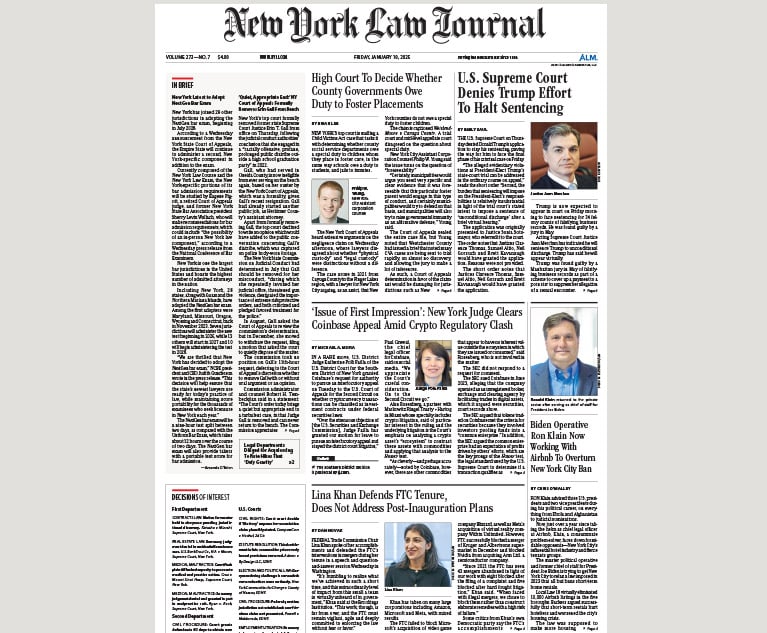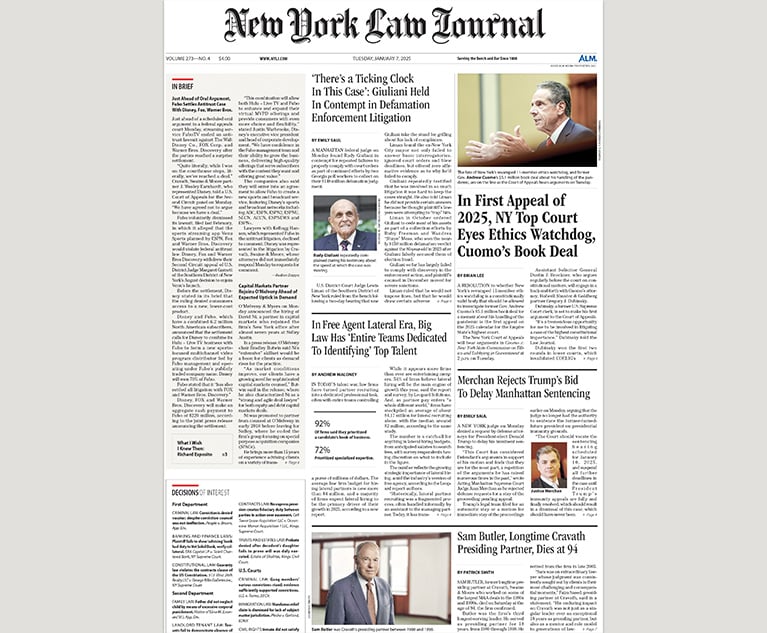Partnership Classes Are Shrinking, Hampering Advancement and Diversity
Law firms, already struggling with diversity among their new partner ranks, are likely to face even higher hurdles as the number of overall promotions falls nearly 30 percent since 2015.
February 06, 2019 at 09:34 AM
6 minute read
The original version of this story was published on The American Lawyer
 (Photo: Shutterstock)
(Photo: Shutterstock)
Life in Big Law was good in 2018, from record-breaking revenues to highs in profits per partner. But appearances can be deceiving—at least for associates hoping for a promotion.
Despite the cash windfall, the prospects of making partner look bleaker and bleaker. Since 2015, the total number of partner promotions among Am Law 200 law firms has fallen 28.8 percent.
In 2018, only 1,544 attorneys were elevated to partner within Am Law 200 firms, the smallest partnership class in five years, according to data provided by ALM Intelligence.
“As a homegrown lawyer, it's harder and harder to make equity partner,” says Kent Zimmermann, a law firm management consultant at the Zeughauser Group. “The bar has been going up, and it's not good enough to just be a really high-quality lawyer anymore at most firms. You usually need to be highly productive in both doing the work and bringing the work in.”
With these heightened standards, a strong lateral market and other industry factors, many industry observers believe partnership classes will continue to remain small as firms look to maintain profitability.
But as the group of new partners stays small, it could continue to hamper the profession's progress toward diversity. Last year, only 574 women were promoted to partner—making up only 37 percent of the partnership class, according to ALM Intelligence. That number was down from 694 the year prior and marked another five-year low. Data was not available on the racial and ethnic breakdown of new partner classes.
For over 10 years, the ratio of women to men entering law firms from law schools has been 1-to-1, and it was thought that, by now, women would make up 50 percent of partnership classes, says Sarretta McDonough, president of the National Association of Women Lawyers.
“It just demonstrates that law firms are not doing a good job of creating homegrown talent and making them partner,” McDonough says.
The market for high-quality talent in Big Law hasn't been this competitive in recent memory, Zimmermann says. This causes firms to want to strengthen their performance, because a better performance and a larger profit pool often create a recruiting advantage. But, in order to strengthen their performance, many firms are raising the bar on what it takes to become and remain a lawyer at the firm at various levels, he says. Firms have been focused on productivity and, for those hoping to make equity partner, originations and the profitability of those originations.
Heightened standards aren't the only impediment to making partner. At some firms, the lack of mandatory retirement means that more and more partners are sticking around instead of passing on their clients and books of business to the next generation of lawyers.
Zimmermann points out that, at some firms, this means a loss of opportunity and potential profit.
“The financial crisis in '08 hurt the retirement plans of a large swath of partners who feel the need to keep earning and try to hold on at their firms, even though they're underproductive, and some firms are permissive of those people hanging on,” Zimmermann says.
Perhaps one of the largest contributing factors to the decline in partnership promotions is the strength of the lateral market.
A recent survey by Citibank and Hildebrandt Consulting found that, in 2017, lateral additions outpaced internal promotions for the first time, signaling a potential change in the way firms will look to drive revenue growth.
“People don't want to wait for this newly-minted partner to develop business,” says Hilarie Bass, the former American Bar Association president who last year left Greenberg Traurig, where she was co-president, to launch the Bass Institute on Diversity and Inclusion.
Firms will often turn to the lateral market when they look to enter a new region or build out a new practice area, she says.
“It's really about poaching the rainmaker from another firm,” McDonough says. “I fear that we're playing musical chairs with a lot of limited lawyers and limited partners.”
As firms remove more chairs from the partnership level, McDonough worries that there will be fewer and fewer opportunities for women and diverse attorneys to have a seat at the partnership table.
Five years ago, 599 women were promoted to partnership in the Am Law 200 and that number inched up year over year, according to ALM Intelligence. In 2017, women made up 37 percent of the partnership class, but last year the proportion of women elevated remained flat.
“It's the lack of the opportunity at the lowest level all the way up through their careers,” McDonough says.
Many female and diverse lawyers drop out of Big Law before they get to the level where they would be considered for partnership. Women joining firms out of law school are reaching that point in their early 30s, around the same time many of them are deciding whether to have children, McDonough says. And once a woman decides to have a child, research shows that she is perceived as being less committed to her profession, says Bass, who as head of the ABA launched a study into why women leave the profession during the latter part of their careers. Men, meanwhile, are perceived as breadwinners who are more committed to work, she says.
“Clearly there are some women who leave because of a balance standpoint,” Bass says. “But there are just as many, if not more, who say, 'I'm not being treated fairly anymore, I'm not getting the opportunities I need to be successful,' and it's a self-fulfilling prophecy.”
Bass and McDonough agree that firms need to do a better job of managing their pipeline of female and diverse lawyers.
Otherwise, McDonough says, “at the end of the day, when they look around and look at who's now reached the level of seniority to be considered, they're left with a lot of white men.”
Email: [email protected]
This content has been archived. It is available through our partners, LexisNexis® and Bloomberg Law.
To view this content, please continue to their sites.
Not a Lexis Subscriber?
Subscribe Now
Not a Bloomberg Law Subscriber?
Subscribe Now
NOT FOR REPRINT
© 2025 ALM Global, LLC, All Rights Reserved. Request academic re-use from www.copyright.com. All other uses, submit a request to [email protected]. For more information visit Asset & Logo Licensing.
You Might Like
View All
Sullivan & Cromwell Signals 5-Day RTO Expectation as Law Firms Remain Split on Optimal Attendance
Trending Stories
- 1Legal Tech's Predictions for Legal Ops & In-House in 2025
- 2SDNY US Attorney Damian Williams Lands at Paul Weiss
- 3Litigators of the Week: A Knockout Blow to Latest FCC Net Neutrality Rules After ‘Loper Bright’
- 4Litigator of the Week Runners-Up and Shout-Outs
- 5Norton Rose Sues South Africa Government Over Ethnicity Score System
Who Got The Work
Michael G. Bongiorno, Andrew Scott Dulberg and Elizabeth E. Driscoll from Wilmer Cutler Pickering Hale and Dorr have stepped in to represent Symbotic Inc., an A.I.-enabled technology platform that focuses on increasing supply chain efficiency, and other defendants in a pending shareholder derivative lawsuit. The case, filed Oct. 2 in Massachusetts District Court by the Brown Law Firm on behalf of Stephen Austen, accuses certain officers and directors of misleading investors in regard to Symbotic's potential for margin growth by failing to disclose that the company was not equipped to timely deploy its systems or manage expenses through project delays. The case, assigned to U.S. District Judge Nathaniel M. Gorton, is 1:24-cv-12522, Austen v. Cohen et al.
Who Got The Work
Edmund Polubinski and Marie Killmond of Davis Polk & Wardwell have entered appearances for data platform software development company MongoDB and other defendants in a pending shareholder derivative lawsuit. The action, filed Oct. 7 in New York Southern District Court by the Brown Law Firm, accuses the company's directors and/or officers of falsely expressing confidence in the company’s restructuring of its sales incentive plan and downplaying the severity of decreases in its upfront commitments. The case is 1:24-cv-07594, Roy v. Ittycheria et al.
Who Got The Work
Amy O. Bruchs and Kurt F. Ellison of Michael Best & Friedrich have entered appearances for Epic Systems Corp. in a pending employment discrimination lawsuit. The suit was filed Sept. 7 in Wisconsin Western District Court by Levine Eisberner LLC and Siri & Glimstad on behalf of a project manager who claims that he was wrongfully terminated after applying for a religious exemption to the defendant's COVID-19 vaccine mandate. The case, assigned to U.S. Magistrate Judge Anita Marie Boor, is 3:24-cv-00630, Secker, Nathan v. Epic Systems Corporation.
Who Got The Work
David X. Sullivan, Thomas J. Finn and Gregory A. Hall from McCarter & English have entered appearances for Sunrun Installation Services in a pending civil rights lawsuit. The complaint was filed Sept. 4 in Connecticut District Court by attorney Robert M. Berke on behalf of former employee George Edward Steins, who was arrested and charged with employing an unregistered home improvement salesperson. The complaint alleges that had Sunrun informed the Connecticut Department of Consumer Protection that the plaintiff's employment had ended in 2017 and that he no longer held Sunrun's home improvement contractor license, he would not have been hit with charges, which were dismissed in May 2024. The case, assigned to U.S. District Judge Jeffrey A. Meyer, is 3:24-cv-01423, Steins v. Sunrun, Inc. et al.
Who Got The Work
Greenberg Traurig shareholder Joshua L. Raskin has entered an appearance for boohoo.com UK Ltd. in a pending patent infringement lawsuit. The suit, filed Sept. 3 in Texas Eastern District Court by Rozier Hardt McDonough on behalf of Alto Dynamics, asserts five patents related to an online shopping platform. The case, assigned to U.S. District Judge Rodney Gilstrap, is 2:24-cv-00719, Alto Dynamics, LLC v. boohoo.com UK Limited.
Featured Firms
Law Offices of Gary Martin Hays & Associates, P.C.
(470) 294-1674
Law Offices of Mark E. Salomone
(857) 444-6468
Smith & Hassler
(713) 739-1250









